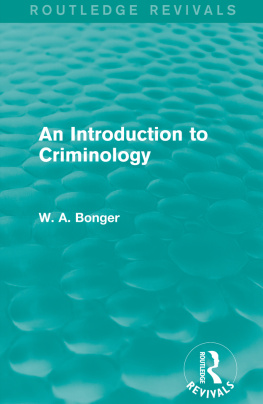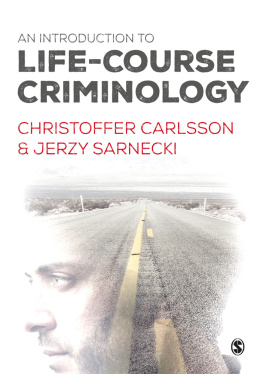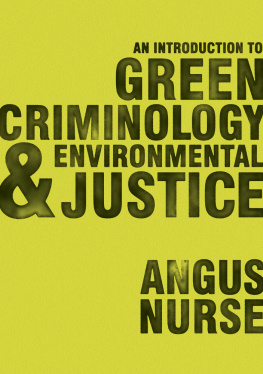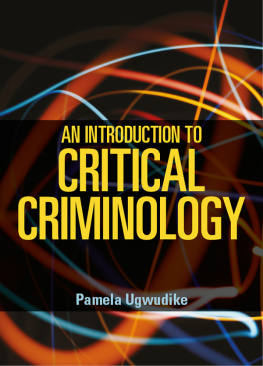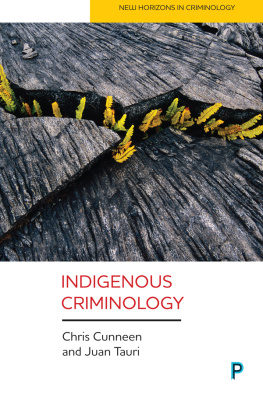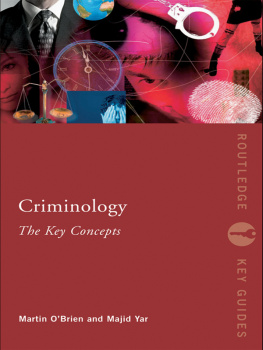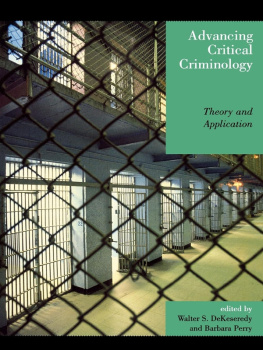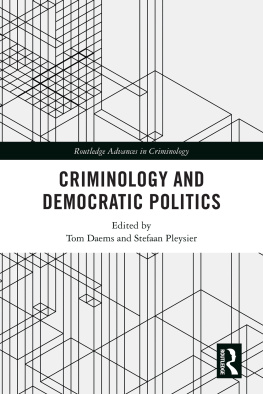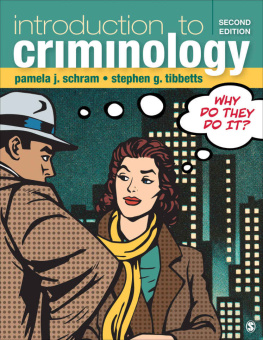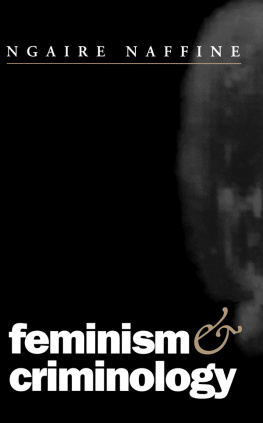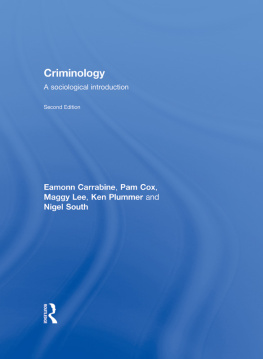First published in 1936
by Methuen & Co.
This edition first published in 2015
by Routledge
2 Park Square, Milton Park, Abingdon, Oxon, OX14 4RN
and by Routledge
711 Third Avenue, New York, NY 10017
Routledge is an imprint of the Taylor & Francis Group, an informa business
1936 W. A. Bonger
All rights reserved. No part of this book may be reprinted or reproduced or utilised in any form or by any electronic, mechanical, or other means, now known or hereafter invented, including photocopying and recording, or in any information storage or retrieval system, without permission in writing from the publishers.
Publisher's Note
The publisher has gone to great lengths to ensure the quality of this reprint but points out that some imperfections in the original copies may be apparent.
Disclaimer
The publisher has made every effort to trace copyright holders and welcomes correspondence from those they have been unable to contact.
A Library of Congress record exists under LC control number: 37014045
ISBN 13: 978-1-138-91158-1 (hbk)
ISBN 13: 978-1-315-69253-1 (ebk)
THIS book appeared about three years ago in the Dutch 'University Extension Library' ( Volksuniversiteitsbibliotheek ). The size of the works which are published in this series is the same for all; and it was therefore impossible to deal equally with the various branches of criminology, more especially criminal psychology, where I have confined myself to giving a historical survey. The short bibliography has now been brought up to date.
This Introduction is widely used in the Netherlands by students, lawyers, and all those who are interested in the terrible problem of crime. I hope this will also be the case in English-speaking countries, where there exists, as far as I am aware, no such succinct survey of the subject.
If the book is received by the critics as favourably as was my Criminality and Economic Conditions many years ago I shall be satisfied.
I wish to express my thanks to the translator, Mr. E. van Loo, for the good care which he has bestowed on my book.
W. A. BONGER
AMSTERDAM
April 1936
Chapter I
Introductory
BY criminology we mean the science whose purpose is the study of the phenomenon called criminality, in its entire extent (this is theoretical or 'pure' criminology) whilst side by side with this theoretical science, and founded upon its conclusions, we have what is called practical or applied criminology. Criminology is an inductive science which, like other inductive sciences, observes the facts with the greatest possible exactitude, and endeavours with the aid of available methods to trace the causes of the phenomena coming to its notice (etiology). Vere scire est per causas scire as Bacon has already taught us.
The subject-matter, therefore, of the science of criminology is criminality, i.e. the crimes which are committed and the persons who commit them; the juridical aspect of the problem, i.e. the legal formulation of the various crimes being at best a matter of indirect interest to the criminologist.
It may be useful to state briefly what exactly is meant by crime. From the formal or legal point of view, a crime is an action on which the community ( in casu the State) has set a punishmenta definition which, like most formal definitions, does not take us much further. Another angle, from which we penetrate further into the essence of the question, is the view that crime belongs to the category of immoral actions. The question which is often asked, whether crime, per se, should always be ranked as immoral, must, I believe, be answered in the affirmative, although admittedly there are instances (i.e. under despotic rule) where an action stamped as criminal is not felt to be immoral by anybody. In that case we have to do with actions which are merely formally criminal. A penal code of that sort does not, of course, tend to ensure the protection of the community; on the contrary, it gives all the more cause for resistance to the despotic ruler. It must not be thought, however, that even in those cases where both factors of the definition are present, the whole of the population necessarily considers the action in question as immoral, or even to a uniform degree. In any complex form of society, where the population is divided into sharply differentiated groups and classes, and in which each person may belong to more than one group, differences of appreciation in these matters may be observed. We may, however, be justified in saying that in modern countries practically all actions which are qualified as crimes are felt to be immoral by the great majority of the peoplealbeit in different measure. Even the professional criminal thinks of theft as of something immoral namely when it is committed to his own detriment, or to that of a member of his gang. It is almost superfluous to add that apart from the differences mentioned above, the degree of public disapprobation of all the countless prohibited actions varies very widely, and ranges from a minimumas in cases of poaching or smugglingto the height of moral indignation in some of the worst cases of manslaughter or murder.
If one asks oneself what actually constitutes the essence of an immoral action it becomes apparent that there are two sides to it: subjectively, i.e. from- the individual's point of view, such actions go counter to moral sentiment; while objectively, i.e. from society's point of view, they constitute a danger to the interests of the community. Sociological (and, more especially, ethnological) research does not leave any doubt upon this point: the term 'immoral' meansfrom the standpoint of the community, 'anti-social'. Thus, the utilitarians erred when they imagined they could define morality as utility for the individual; but this view becomes correct when for the individual one substitutes the community; for the whole of our code of morals is designed for its benefit and protection. Man is extremely sensitive to that which might harm the community as a whole; and broadly speaking, this instinct has but rarely proved itself wrong (one instance of this being the persecution of witches). In such cases it was experience which acted as a corrective. In view of the absolute supremacy of society over the still growing and maturing individual the latter, as a rule, tends to accept without demur the moral code prevailing in his time.
Ail immoral action, therefore, is an anti-social action which is felt as such. A priori, one cannot speak of any action as being either immoral or criminal per se ; there is, in fact, no such thing as a 'natural' offence. It all depends upon social conditions. Some actions, however, are so obviously hostile to the interests of any and every society that there was hardly ever a time when they were not prohibited, as in the case of theft, because of its parasitical character. Society is continually changingand, especially in its present phase, very rapidly. Hence the great changes which take place in our conception of morality, and which are reflected also in criminal law. These, however, take time; and the tension between a rapidly-changing morality and a comparatively static criminal law can, at times, become very great.


